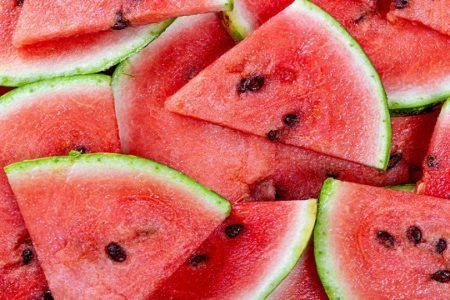Watermelons and fun seem to go together, whether they’re served as appetizers at a family gathering or as props in a late-night comedy act.
Watermelon’s Health Advantages
Tim Allerton, a postdoctoral researcher at Louisiana State University’s Pennington Biomedical Research Center in Baton Rouge, said he is pleased by its health advantages.

Fruit is usually a good addition to a balanced diet. But, according to Allerton, the mix of components in watermelon makes it unique.
It’s high in minerals like potassium and magnesium. It’s also high in vitamins C and A (including beta carotene, which aids in the production of vitamin A), as well as B1, B5, and B6. All of this is available for only 46.5 calories per cup.
Watermelon is approximately 92 percent water, which explains why ancient watermelons were transported in Africa’s Kalahari Desert as long as 5,000 years ago. This is a treat with a history: modern-looking copies may be found in Egyptian tombs.
Watermelon stands out due to its high content of antioxidants, which help to control the body’s cell-damaging free radicals. The body has its antioxidant system, but getting a boost from food helps, according to Allerton. Watermelon has a lot of antioxidants.
One of these antioxidants, along with vitamins C and A, is lycopene, which gives watermelon its crimson color. Lycopene is also an anti-inflammatory and has been linked to a lower risk of stroke. It is most plentiful in cooked tomato products, while watermelon has roughly 40% more lycopene than raw tomatoes.
Watermelon also contains glutathione, which Allerton refers to as a versatile and worldwide antioxidant.
Watermelon is also rich in citrulline, an amino acid that has been the subject of Allerton’s study. He describes watermelon as very distinctive since not many meals are rich in this.
Citrulline in watermelon juice was attributed to helping athletes alleviate painful muscles in a modest 2013 research published in the Journal of Agricultural and Food Chemistry.
Citrulline is also connected to the generation of nitric oxide, which is essential for blood vessel function. Several modest studies show that citrulline in watermelon extract may reduce blood pressure, however, those effects were only found in persons who consumed more than 3 pounds of watermelon per day for six weeks.
That is a large amount of watermelon. Aside from the basic concept that overindulging in anything is a poor idea, Allerton claims there are no negative consequences to enjoying it.
Even though it contains natural sugar and has a high glycemic index (a measure of how quickly sugar enters the circulation), it has a low glycemic load. This indicates that its real effect on blood sugar is minor. And, unlike, say, a dish of cookies, it will fill a person up quickly.
Aside from nutrition and science, fans of the fruit just appreciate the flavor.
It is the chief of this world’s pleasures, monarch by the favor of God above all the products of the land, wrote Mark Twain. He who has tasted it understands what the angels consume.
Allerton loves his watermelon straight up, but he adds that watermelon juice preserves many of the advantages of the entire fruit because so much of it is water.
Watermelon works nicely in smoothies because of this. Alternatively, it can be made into a fruit salsa.
Experts believe that the key to identifying a ripe watermelon is to check for a creamy yellow mark where the watermelon sat on the ground. If the patch appears white rather than yellow, the melon may not be fully ripe. Weight is also an indicator of quality — the heavier the better.
However, most experts agree that pounding a watermelon won’t teach anyone anything about its ripeness. So they’ll have to leave it to the comedians.
